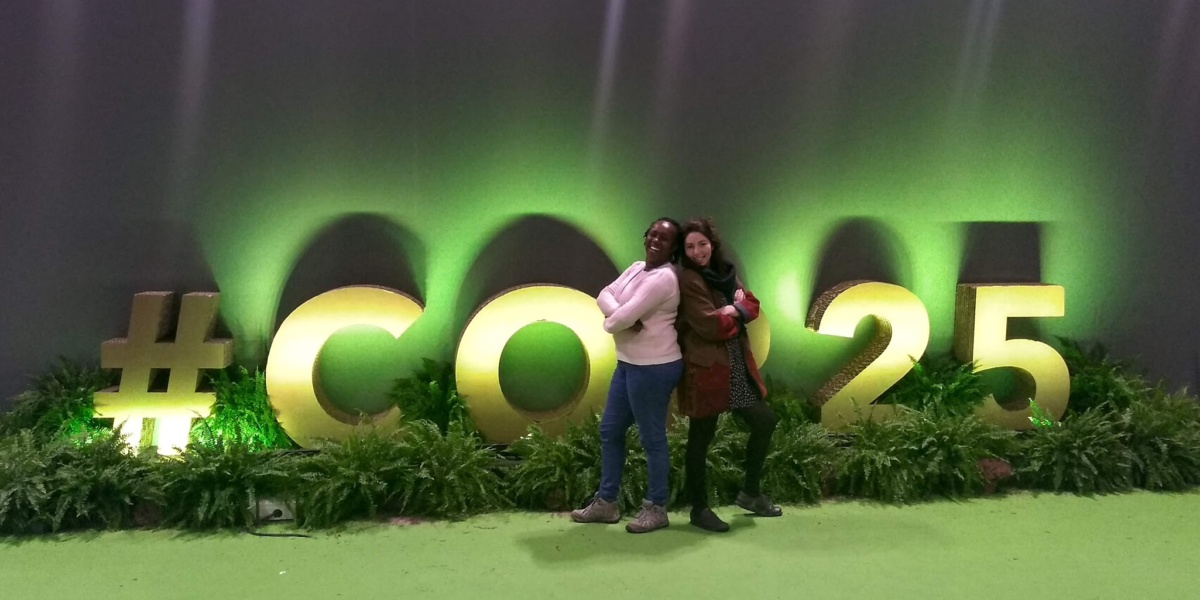In December 2019, WEGO PhD researchers Alice Owen and Eunice Wangari joined the thousands of negotiators, climate action advocates and researchers who convened in Madrid for the UN’s 25th annual climate change Conference Of the Parties (COP25). Whilst most media coverage focuses on the outcomes of the high level summits, COP25 is an important arena for all levels of climate politics as civil society converges to put pressure on governments to listen to the science and agree strong climate policies. Over the busy fortnight, Eunice and Alice found countless opportunities to learn about these global climate change politics which contextualises their research with communities in Kenya and the UK. In this blog we join Alice and Eunice in conversation to find out more about their diverse inside experiences and perspectives of this important event.
How does climate change come into your research?
Eunice: Climate change adaptation is the context of my research. My research delves into the gendered adaptation strategies that the Maasai community in Southern Kenya use to weather the increasingly severe droughts and floods that frequent the region. Using an intersectional lens, I am exploring how local forms of knowledge systems and practices are mobilised and used in tandem with conventional knowledge to adapt to the changes. I also explore how these adaptation strategies shape subjectivities of today’s Maasai men and women. To gain a multi-scalar analysis, I have been following the gender target of the Paris Agreement, that is discussed during the COP.
Alice: My research explores the different forms of knowledge and contestation that are mobilised in campaigns against fracking and unconventional fossil fuels in the UK. Many communities are concerned about the local environmental, geological and social impacts of these industries, as well as their contribution to the climate crisis. Despite the certainty of climate change science and the urgent need for global climate action, in the UK and elsewhere governments continue to act against their own Paris Agreement commitments by allowing the development of new fossil fuel projects. I am researching with anti-fracking campaigners to learn how this implicit climate denial undermines scientific expertise as well as tacit knowledges about the environment and justice.
What were your motivations for going to COP25?

Eunice: A significant amount of data for my MSc thesis was collected at COP23 and the Subsidiary body for scientific and technological advice meetings held in Bonn, Germany. I experienced first hand how diverse actors converged in this forum to discuss various and even differing climate change agendas. Thus, I decided to attend the COP not only as a networking event but to conduct some interviews that I would have otherwise not physically done due to geographical constraints. More so, I secured an opportunity to present my research and the WEGO project at large during the gender day, an offer I couldn’t resist.

Alice: I also had the opportunity to attend COP23 in Bonn, and it was there that I first engaged with the UK’s anti-fracking campaign. At a side event, I was really moved by the stories of the communities defending their environment and standing up to fracking in Lancashire, and I found the alliance between frontline communities and persuasive climate scientists really persuasive and interesting. Two years on and having committed to researching with precisely these communities, I was keen to better understand the UK anti-fracking campaign in the context of climate science and international anti fossil fuel campaigns. With the COP being moved from Chile to Spain due to social unrest, I was able to travel by train instead of plane and was lucky enough to organise a conference pass with this short notice.
What did a typical day at COP25 look like for you?
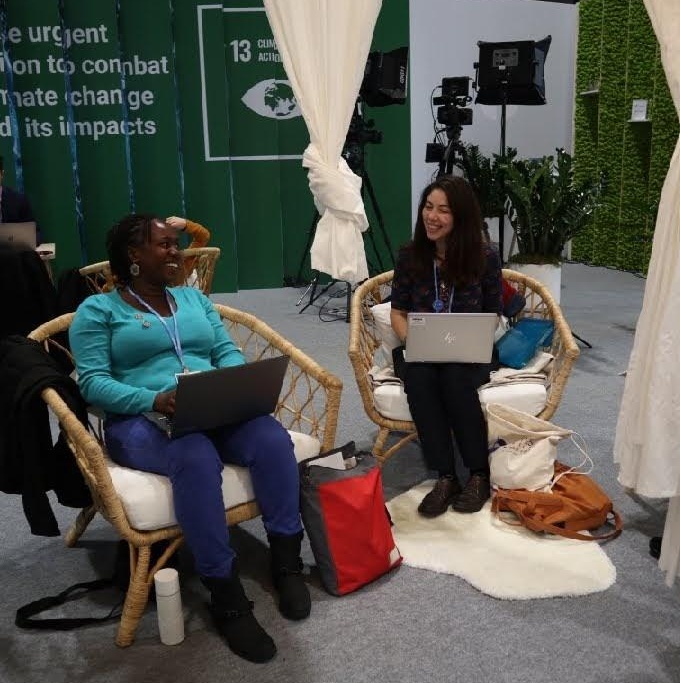
Eunice: Each day at the COP differs largely by the type and officialness of the events and activities scheduled, with some thematic days included. Due to the broad content covered by these events, it requires some level of planning or one risks spending days being confused and not following anything in particular. My day would therefore be planned the previous night where I marked key events that I needed to attend and identified a number of extra ones I found interesting, even though they weren’t the focus of my research. I followed talks and presentations on gender and women rights, indigenous knowledge, environmental justice, adaptation from below, loss and damage and the right to remain in climate induced migration, feminisation of climate change among others. In between attending events, I visited different exhibition booths and learned what countries and organisations were working on, looked for a quiet place to reflect and write down my thoughts or met up with Alice or Angelica at free food locations to catch up as we rescued surplus catering from being wasted. It is amazing how food is used to lure participants to attend events. At times, the food and drink is too much and ends up being disposed of and that is where we and many students at the COP come in.
Alice: Perhaps the only thing the days had in common were having to choose a few key events to attend from the multitude of presentations, discussions and activities organised at various locations across the city. While the high level negotiations proceeded often behind closed doors, in the COP conference centre there were numerous side events to choose from. These usually took the form of expert panels organised in each country’s pavilion or in the dedicated rooms, typically organised by research bodies, NGOs or businesses. I was particularly interested in attending events concerning fossil fuels and the carbon budget, the science-policy interface, and the role of women, youth and indigenous peoples in climate action. Attending these events and conducting follow-up interviews involved lots of running around the huge conference space, so I was very glad to be invited to join the ‘Free Food at COP’ chat to help me refuel!
Outside the COP venue there were also plenty of fascinating events and actions organised in Madrid. One afternoon I attended an event in a hotel organised by The Heartland Institute, who are known to be funded by the fossil fuel industry to promote climate skepticism particularly in the US. I felt very out of place in the small room of predominantly older males advocating for business as usual as far as fossil fuel production is concerned! In complete contrast to this, later in the week I helped make banners at the activist art space and took to the streets with friends to join the huge climate march that called for real action on climate change. Similarly, In parallel to the COP the ‘Cumbre Social Por El Clima’ was organised as a summit for activist groups and campaigners, with many talks and workshops organised including a talk I gave based on the findings of my MA research.
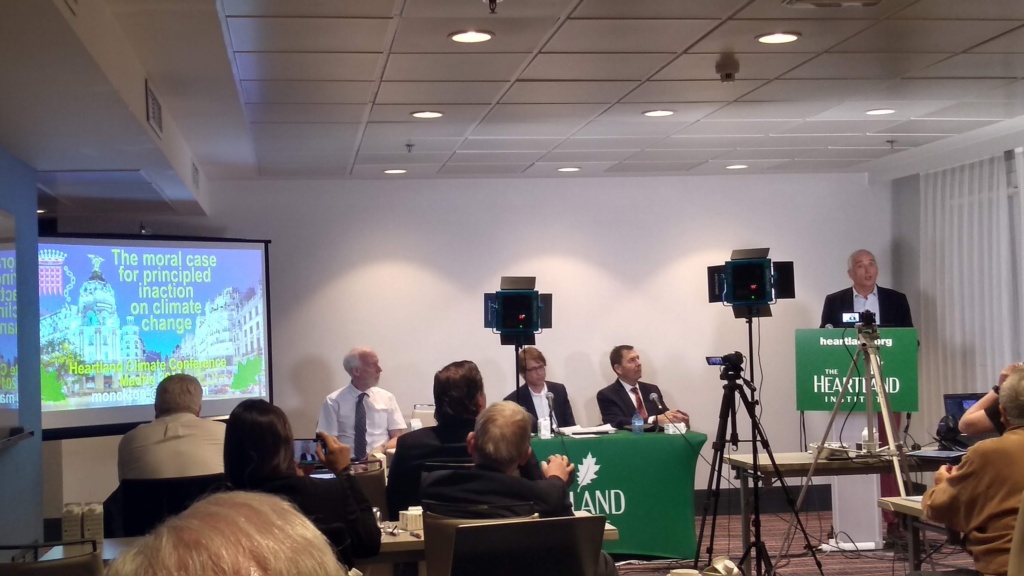
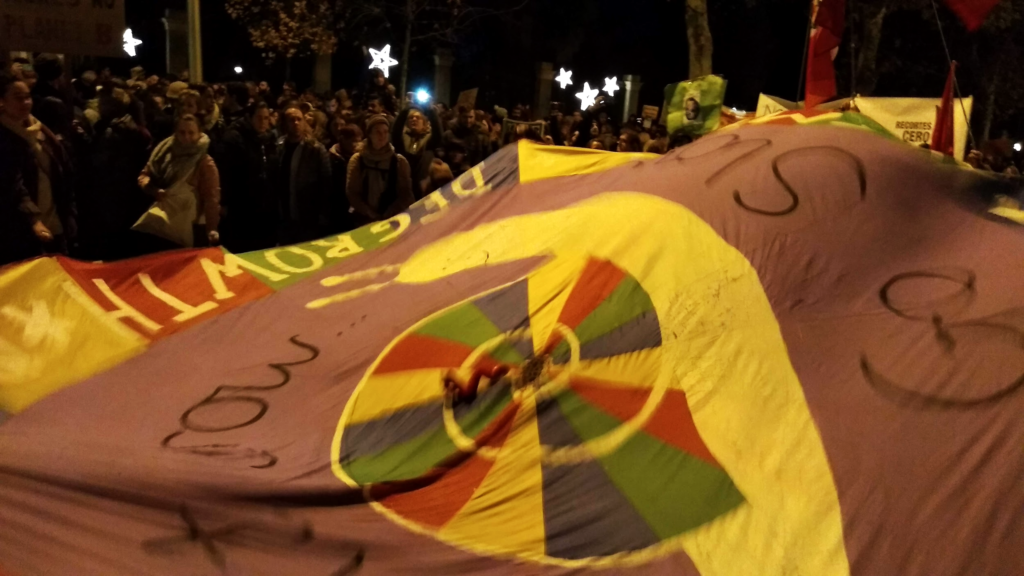
After the events of the day the evenings were no time to rest with so much important socialising and networking to be done. It was only in ‘curious researcher’ mode that I had the stamina for some otherwise unlikely encounters. One evening I could be having tapas with the chief negotiator of Kiribati, the next having drinks with BP insiders, or another evening dancing with green finance professionals. There were also some much more familiar and convivial evenings at the activist art space and listening to the talks and music at the Cumbre Social with friends new and old.
What was the biggest challenge and why?
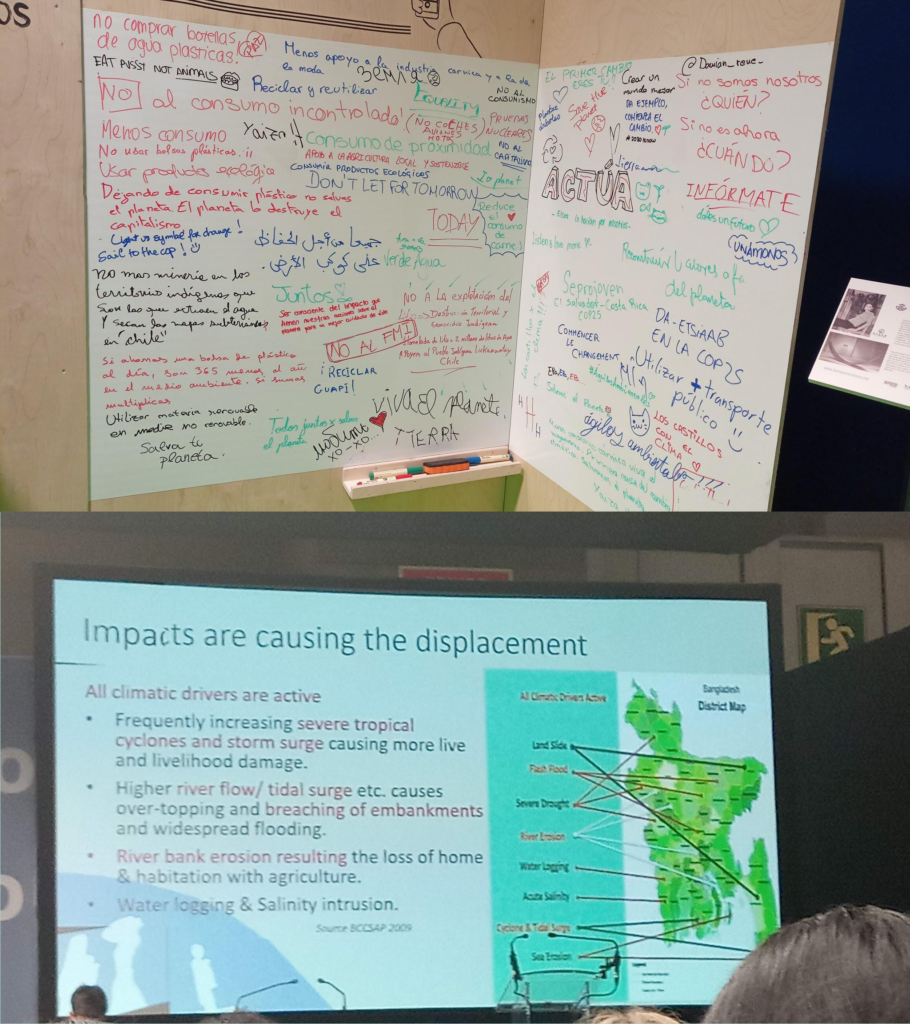
Eunice: The biggest challenge that I faced was choosing between two interesting events scheduled at the same time. Whereas the activities in the blue zone, “La zona azul” were very formal and updated on the main website and app, those in the green zone “zona verde”, where the civil society, youth, indigenous communities, and gender activists converged were given less visibility. That meant receiving information of scheduled activities on a last minute basis as some of these people did not have the resources to disseminate their calendar of events. Additionally, some of the activities in the green zone happened spontaneously in response to an outcome of a formal event. These spontaneous events could get very heated with the protestors being banned from the pavilion at one point, something that fed into my fears of participating in them for a while.
Alice: Throughout the COP I chose to attend really diverse events with all sorts of people, which was quite exhausting as I had to continuously navigate the different social and physical spaces. Something I found particularly challenging about the conference centre was the lack of daylight and access to nature. As I wondered how the negotiators were getting on with their discussions carrying on late into the night, I couldn’t help but imagine what different conference outcomes and global realities might arise if the negotiators convened at the Bolsena Convento where we had our feminist writing retreat in the summer!
Who did you connect with?
Eunice: I connected with several exciting people, but one that intrigued me most was a Kenyan woman in the Beyond Labels, Beyond Borders forum held at the German pavilion. Jolene responded firmly to a Nansen type passport suggestion. She said that the indigenous communities were neither interested in the passports nor were they keen on leaving their native land to be foreigners in other peoples lands. She articulated what is probably in the minds of most indegenous communities members, whose voices are often silenced in making decisions that affect them, as if they were passive victims or recipients. You could hear a pin drop after she said the COP had become one big pleading session without any action. Something we all probably thought but hadn’t said out loud. Later, I hung out with her and her peers, who came from different pastoralist communities in Kenya. They explained the frustrations of attending the COP for years on end without any tangible outcome. “Hii ni kupewa mate tu” she said, Swahili for this is just lip service. After some brief chats, we exchanged contacts and later scheduled an interview with them for my project, which they agreed upon.

Alice: With fracking and unconventional fossil fuels seemingly off the agenda for the side events inside the COP, the Cumbre Social Por El Clima became an important convergence space for network building. Following presentations about fracking and LNG in the US, Argentina and Ireland, a meeting was organised to bring together activists from further afield. I shared insights from the UK, and made important connections to movements elsewhere including the US where I will be going for my secondment. These discussions have been really useful to draw pertinent themes from my research in the UK, and to consider how I can pursue scholar-activism. Connections were also made with UK campaigners who will be particularly active over the coming year as COP26 will take place in Glasgow.
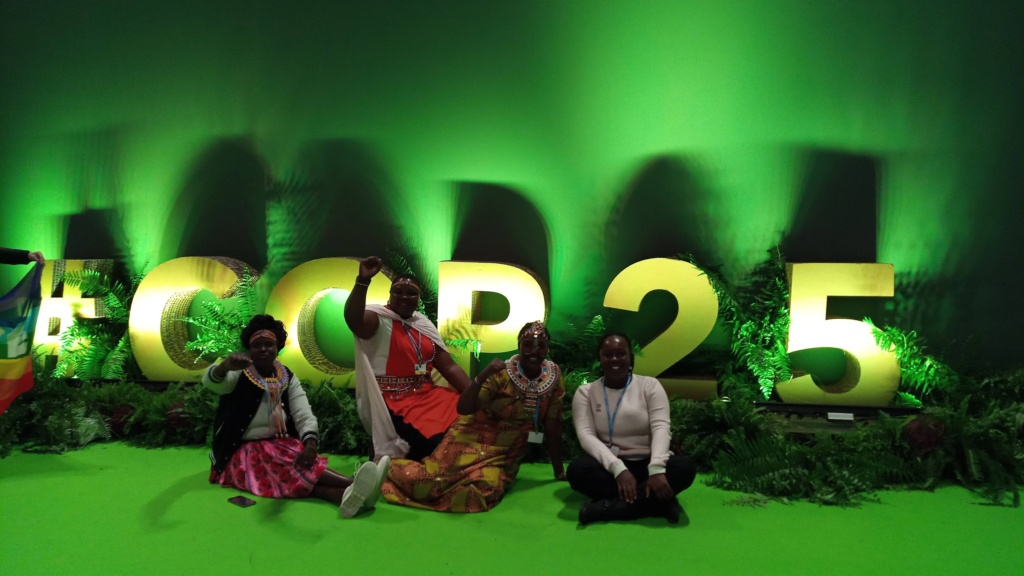
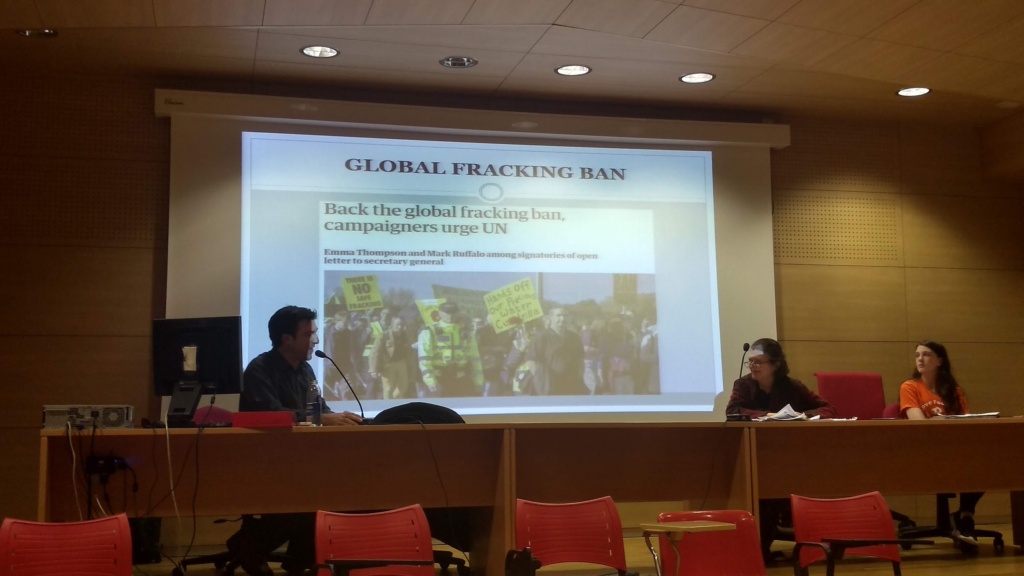
What are some of the key things you learned?
Eunice: I experienced this COP in a very different way to before as together with fellow WEGOer Alice and our friend Angelica we made a perfect team particularly in the last minute logistic arrangements that followed the relocation of the COP to Madrid from Santiago. Being a team provided moral support during low moments, as lethargy builds up fast as the long days go by. In addition to logistics planning, we hung out with each other during the breaks, sharing how the sessions we attended were, brainstormed which events to attend, or to catch up on work together. With that, I learnt the value of being in a network like WEGO.
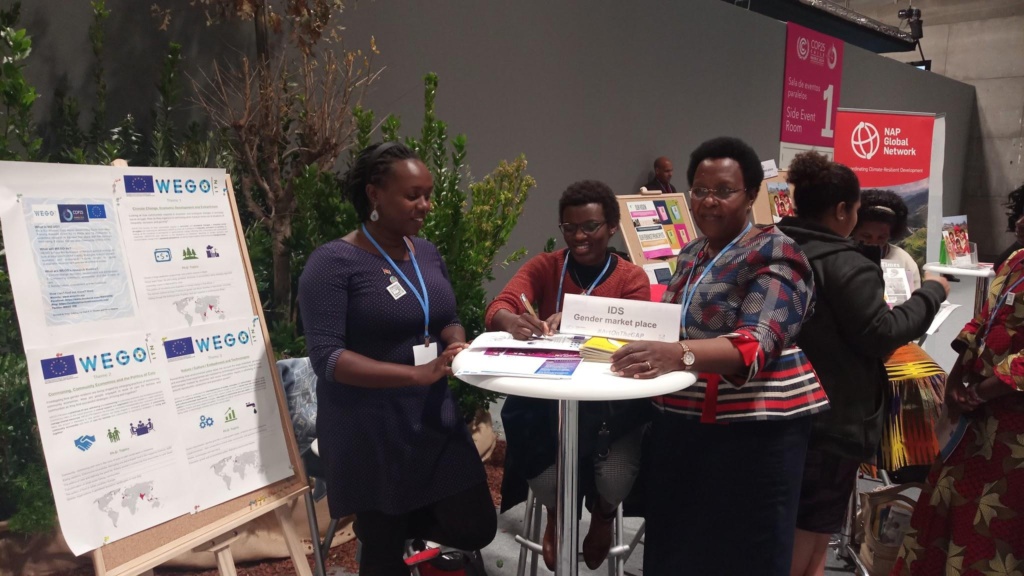
I also experienced the value of keeping close networks when I received an email from the Women and Gender Constituency working group inviting me to host an exhibition during the 10th December Gender day. This was a pleasant surprise as the exhibition was not guaranteed when the COP moved to Madrid from Santiago. I grasped the opportunity and hosted the exhibition for some hours. There, I came in contact with diverse people who had a tonne of questions about the WEGO project, our objectives and the EU H2020 funding process. I interacted with fellow exhibitors from all over the world.
One day, I was requested by a Masters student studying Feminist Political Ecolgy to be interviewed on my experience as a woman in the COP. The interview served as a reflection of the privileges I had as someone working on a EU funded project, hence subsistence money to travel and live through the conference was not any challenge. At the same time, I recalled my underlying fears for attending protests and how my interactions during the COP were to a large extent shaped by my identity as a black woman funded by the European Union.
Alice: I definitely learned a lot this COP by getting out of my comfort zone and spending time observing and participating in the many arenas of climate change politics. It is all too easy to stay in your bubble where there are familiar outlooks and ideas, but listening to and sharing with others really helps to refresh and recontextualise your own perspectives. For example, having been involved for several years in the climate activist networks I found that I wasn’t learning much more from attending these events. However, at The Heartland Institute’s event I was confronted with many new discourses that require acknowledgment from climate campaigners. It is evident that populist politics have adopted many tactics and even arguments from more progressive campaigns to the extent that there are some disconcerting similarities. Both call the other “mad”, and both distrust the corporate capture and inaction of the COPs thus far. With politics becoming more polarised, climate change activism will have to evolve to maintain strong advocacy for social justice and democracy and to avoid ecofascist tendencies.
What are your highlights?
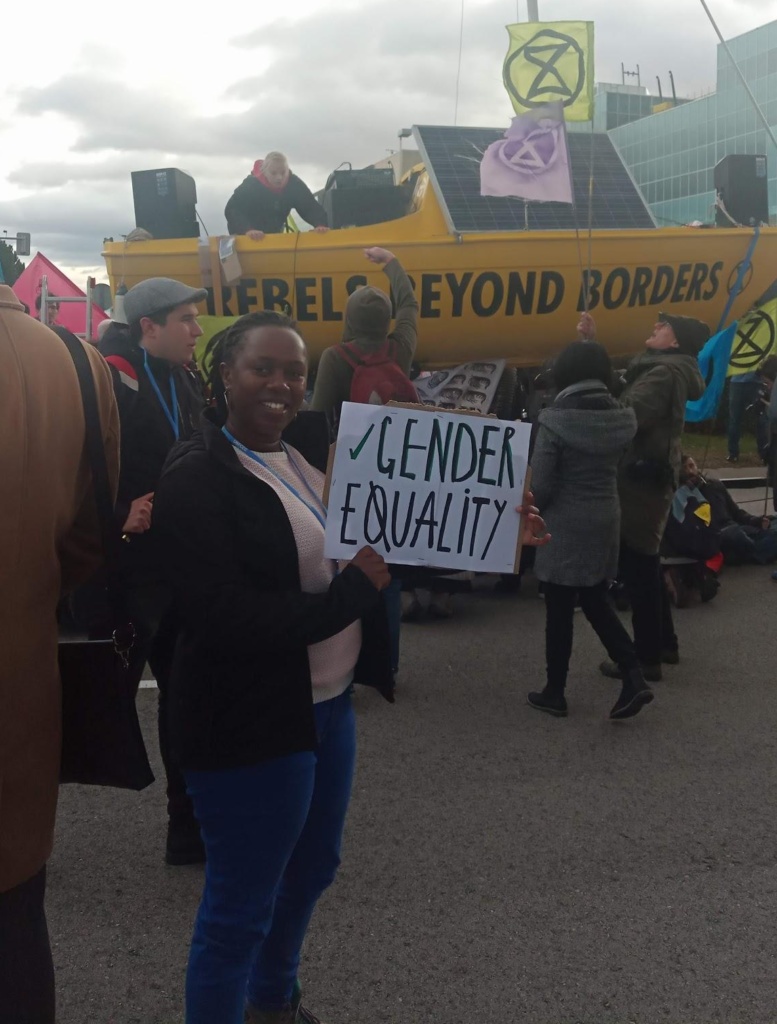
Eunice: My highlight was coming out of my comfort zone and participating in the final protest, which comprised both conference participants and members of the Extinction Rebellion and Fridays For Future climate activist groups. Being my first activism protest, I was super anxious, perhaps due to the anticipation buildup and having to deal with my underlying fears to finally join and become part of this admirable action. The protest started inside the pavilion with young people from the global south making speeches in their native languages before proceeding outside and going along the streets up to the roundabout at the IFEMA junction. We sang protest songs and repeated slogans that called for acceleration of climate action, something that resonated with Jolene’s previous sentiments. After hours of sitting in and protesting,I became relaxed and felt part of the movement, that was uncharted territory for me, just a couple of days ago.
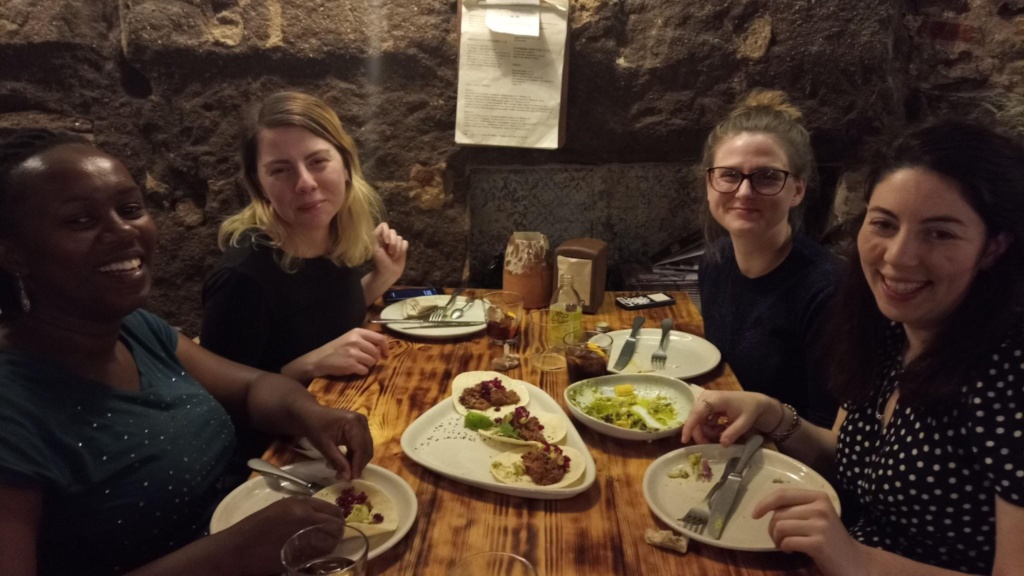
Alice: It was so valuable to go to this COP with friends old and new from WEGO and our ever-expanding family. Even if we were doing completely different things all day, when we did find time to pause and digest what we’d been up to there were always so many fascinating stories to be shared.


